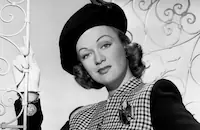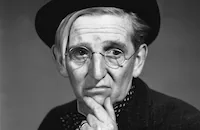Cocoanut Grove
Cast & Crew
Alfred Santell
Fred Macmurray
Harriet Hilliard
Yacht Club Boys
Ben Blue
Eve Arden
Film Details
Technical Specs

Synopsis
Chicago bandleader Johnny Prentice continually loses bookings because of his bad temper. After his adopted son Half-Pint is temporarily taken away from him because he has no tutor, several bandmembers, including Tony Wonder, lose faith in Johnny and leave the band. Johnny hires lovely Linda Rogers to tutor Half-Pint, and in time, Johnny and Linda fall in love. She encourages Johnny to follow his dream of playing at the Cocoanut Grove club in Los Angeles, and tells him that the club auditions and showcases unknown bands every spring. When Dixie, a band member, wins a trailer through a cereal contest, Johnny sees his opportunity and buys an old jalopy to take the band to California. At a trailer park, Linda encourages Hula Harry, the pianist, to play his own songs, while she sings. Harry's song is a big hit at the camp, and Johnny discovers both Harry's and Linda's talents. In the midst of a downpour in Kansas, the car literally falls apart and is towed by garage owner Bibb Tucker. Bibb is a whiz with sound effects, so Johnny convinces him to join the band and tow them to California. After more adventures, they reach the club and audition, but club owner Robert Grayson mistakes Tony Wonder's band for Johnny's and hires them instead. Crushed by his apparent failure, Johnny and his musicians disband, and Linda, believing he is flirting with Hazel from Tony's band, boards a bus headed for Chicago. Backstage at the Grove, Bibb overhears Tony scheme to get Harry's signature song and realizes that Tony's band was hired by mistake. He tells Johnny, who, with the speakers on Bibb's truck, drives through Los Angeles asking his scattered band members to return to the club. Overhearing his announcement, the band members drop their jobs and rush to the Grove, where they beat up Tony's band and lock them in the dressing room. Meanwhile, Johnny catches up with Linda's bus. The band is a big success, and Johnny and Linda arrive just in time to play their signature song with Grayson's approval.

Director
Alfred Santell
Cast

Fred Macmurray
Harriet Hilliard
Yacht Club Boys

Ben Blue

Eve Arden
Rufe Davis
Billy Lee
George Walcott
Dorothy Howe
Red Stanley
Harry Owens

Charles Lane

Roy Gordon
Paul Newlan
Dorothy Dayton
Frances Morris
Terry Ray

Jimmy Conlin
Max Wagner
Archie Twitchell
Phillip Warren
Jack Hubbard
Cliff Clark
Ronnie Rondell
Stanley Andrews
Jack Gardner
Larry Harris
Dix Davis
Dolores Casey

William Davidson
Murray Alper
Egon Brecher
Jack Pennick
Yvonne Duval
Norah Gale

Laurie Lane
Lola Jensen
Gwen Kenyon
Mary Parker
Carol Parker
Cheryl Walker
Dorothy White
Sheila Darcy
Harriette Haddon
Helaine Moler
Barbara Salisbury
Louise Seidel
Ruth Rogers
Janet Waldo
Joyce Mathews
Barbara Jackson
Marion Weldon
Gloria Williams
Ethel Clayton
Crew
George M. Arthur
Roland Asher
Sy Bartlett
Hugh Bennett
Olive Cooper
Hans Dreier
Harvey Dwight
Arthur Franklin
Ralph Freed
A. E. Freudeman
Edith Head
Earl Hedrick
Frederick Hollander
Don Johnson
Bert Kalmar
Burton Lane
William Lebaron
Frank Loesser
Harry Mills
Boris Morros
Harry Owens
Jack Rock
Harry Ruby
The Yacht Club Boys
Leo Tover
Eddie Welch
Victor Young
Adolph Zukor

Film Details
Technical Specs

Quotes
Trivia
According to a Paramount press release, on 28 March 1938, while waiting to be called to join Fred MacMurray and Harriet Hilliard for a scene, 8-year-old actor Billy Lee had two of his teeth knocked loose by his young stand-in, Roland Smith, when the two boys simultaneously attempted to grab for a ball they were playing with - the top of Smith's head crashed into Billy's face. Director Al Santell had Billy whisked off to a Hollywood dentist's office in a studio car while scenes not needing Billy were filmed instead. After extracting the two drooping teeth, the dentist, Dr. Ervin Robert Barr, working from a studio still of Billy, creating a removeable plate for him that was an exact match of the original teeth by 7pm that evening. Since Billy was needed for many scenes in the movie, Santell did not want to risk another change in his shooting schedule or a sudden, unexplained change in Billy's appearance, such as missing teeth. So Santell asked Billy to refrain from any rough-and-tumble activity and to stick to soft foods for the duration of filming, as Billy also had two loose baby teeth from before the mishap which Santell was determined would make it to the last scene.
Notes
The premiere program credits the music and lyrics of the song "Four of the Three Musketeers" to the Yacht Club Boys. A song of the same name was first written by Bert Kalmar and Harry Ruby for the Marx Brothers play, Animal Crackers. The Cocoanut Grove at Hotel Ambassador in Los Angeles was known as the "springboard of the stars," having launched many performers' careers. According to Motion Picture Herald, the film was previewed at the nightclub for an invited audience. Harry Owens made his film debut in the film. According to a 1957 article in Los Angeles Times, Tony Martin and Paramount were planning a remake of Cocoanut Grove to coincide with the remodeling of the now extinct nightclub. However, no film was released.












